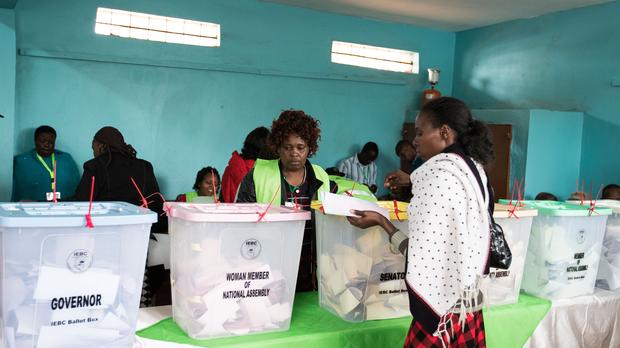Vote tallying delays Kenya elections final results
August 11, 2017
Kenya’s Independent Electoral and Boundaries Commission (IEBC) on Friday, asked for patience as its officials and party representatives tallied the votes in order to dispel claims of vote rigging.
Result released so far indicated that incumbent President Uhuru Kenyatta was leading by a wide margin, but his rival Raila Odinga has claimed the electronic voting system has been tampered with to “steal” the election. He is demanding access to inspect the servers.

However, the tallying process continued way past the time the IECB was to have announced the results. Kenyatta, Odinga and other party leaders had been waiting for the final presidential and parliamentary polls at the national tallying centre in Nairobi since noon. By 5.30pm the results had still not been announced.
IEBC officials occasionally came to the podium to ask Kenyans to be patient and to remain calm.
Nearly 20 million Kenyans registered to vote in the country, which has a population of about 48 million.
Eight candidates contested the election, but the election turned out to be a two-horse race between the incumbent president, who is the son of the founding Kenya leader Jomo Kenyatta — and Odinga who leads the National Super Alliance (NASA).
The super alliance is made up of the member parties belonging to the Coalition for Reform and Democracy. They include the Orange Democratic Movement led by Odinga, Wiper Democratic Movement of Kalonzo Musyoka and the Forum for the Restoration of Democracy which has Moses Wetang’ula at the helm and the Amani National Congress under Musalia Mudavadi.
Kenyatta campaigned on infrastructure development, including the new US $3.2bn Chinese-funded railway line from Nairobi to Mombasa, and successes in the fight against corruption as reasons voters should re-elect him for another five-year term.
Odinga, who had previously failed to win the presidential elections three times, pointed to the rising cost of living and what he said was the mismanagement of the economy as failures of the Jubilee party’s government.
Since Wednesday, Odinga and his NASA coalition have been disputing the accuracy of the ballot counting. The 72-year-old claimed hackers had accessed the election management system and altered the results to favour his younger rival Kenyatta, 55, and his Jubilee party.
The IEBC, which spent about US $500 million on the new biometric voting system, has dismissed Odinga’s claims but admitted there had been unsuccessful attempts to hack the system.
The dispute over the accuracy of the vote counting process led to sporadic incidents of violence that have left at least five people dead.
Before the announcement of the final ballot tally, there was a stand off between Odinga’s supporters and police at the edge of Kisumu, an opposition stronghold. Police used tear gas to prevent the protesters from entering the port city in Kisumu County, where many of the shops opted to stay closed.
Kenya has 47 counties and reports of sporadic violence seemed limited to Kisumu.
Fires were also lit on the streets raising fears of post election violence similar to that of 2007 in which more than 1,100 people died and 600,000 others were displaced.
Speaking on Aljazeera Television on Friday, while results were being tallied, George Kegoro of the Kenyan Human Rights Commission said the government has “a responsibility to keep this country peaceful and that is a responsibility that it has failed”.
Former South African President Thabo Mbeki, who is leading the African Union election observer mission, on Thursday said the election was peaceful and had met the laid out standards.
Other foreign observer missions from the European Union, Commonwealth, and the Carter Center urged party leaders to refrain from inflaming tensions.
Former US Secretary of State John Kerry, who is heading the Carter Centre, said if measures put in place by the electoral commission are followed to the end Kenyans “can have confidence in the outcome of this election”.
There was no immediate indication of the impact of the elections on the economy, which has grown by about 5.5 in the last few years — down from the 2016 forecast the World Bank’s Kenya Economic Update (KEU) indicates. The Kenyan economy is among the most advanced and diversified in Africa. It contributes 40 percent of East Africa’s GDP.


